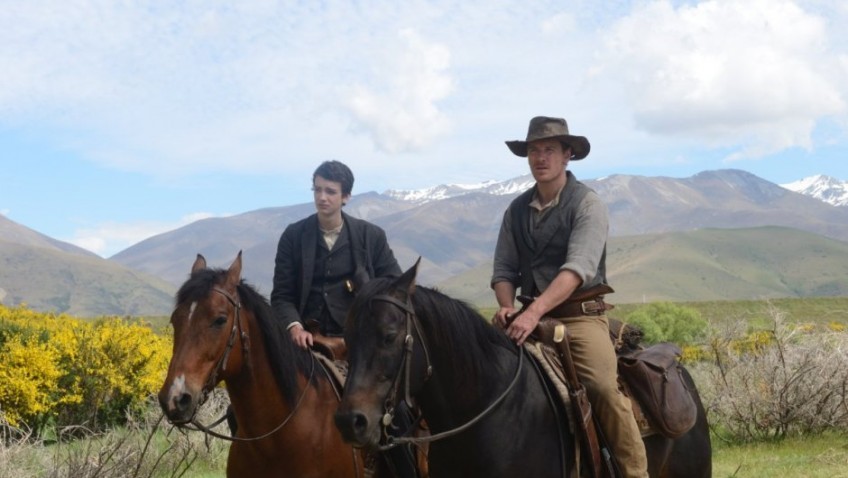Clint Eastwood’s 1992 Academy Award winning film, The Unforgiven might have been the Revisionist Western that resuscitated a dying genre, but since then, there have been dozens of followers – many made by non-American directors and actors and shot outside of the USA. A few months ago, we saw Danish Director Kristian Levring’s The Salvation shot with South Africa. And now we have British Writer/Director John Maclean’s Slow West, an impressive, but uneven and rambling feature film debut which was shot in New Zealand and the Scottish Highlands with a notably international cast. While the cliché of the lone, peripatetic gunslinger with a heart is filled by Michael Fassbender (12 Years a Slave, Hunger), Maclean’s Western is actually a coming-of-age story of unrequited love.
In Colorado, 1870, the harsh environment and the beleaguered Native Americans are the least of Jay Cavendish’s (Kodi Smit-McPhee) worries. The naïve, but determined, 16-year-old Scot has run off from his well-to-do family in Scotland to be reunited with his childhood sweetheart, Rose Ross (Caren Pistorius). As he follows his lead to Rose, he is unaware that a lot of dangerous, seasoned bounty hunters are looking for her, too. They are also after her father, John, (Rory McCann), who fled with Rose from Scotland in mysterious circumstances and is now lying low somewhere in Colorado.
Bounty Hunter Silas Selleck (Fassbender) is a self-sufficient loner, or so he thinks, having split from a group headed by Payne (Ben Mendelsohn), now a deadly rival. When Silas comes across Jay, he saves him from the first of several humiliating predicaments that the dreamy, ill-equipped Scot finds himself in. Resigned to his need for a scout, Jay pays Silas to guide him to Rose. The dramatic irony is not lost on the audience, as Jay is unwittingly leading this double-dipping bounty hunter to an even bigger prize. Along the way, however, a bond develops between Silas, who is more vulnerable than he thinks but cares for no one, and the strong-willed Jay, who cares for Rose more than his own life.
Maclean plays up Jay and Silas’s humorous, and slightly surreal, encounters along the journey as if to offer respite for the moments of shocking (and sometimes disconcertingly abrupt) violence, not to mention the tragic finale.
While Jay’s single-minded quest is always the focus, these encounters allow us to glimpse the West, just five years after the Civil War, stripped of its romance and mythical qualities. And these glimpses of a range of immigrants engaged in the hard job of survival are, arguably, the best part of the film. Along the way, to immigrant Rose (living with a Native American hired hand), we notice a band of Congolese musicians, German researchers, Asian bandits, and a rainbow coalition of bounty hunters. We linger a little longer on a Scandinavian family resorting to violence to steal food from a general store while their blond, blue-eyed children wait hopefully outside, holding hands. Rose Ross is everything to Jay, but she is just another foreigner, resorting to violence to survive in the West.
Kodi Smit-McPhee was 13 when he received rave notices for his role as the boy in the dystopian road movie, The Road. Now, at 19, though the Australian born actor’s Scottish accent is shaky, he is impressive, if a little too bland, as a young Don Quixote in another road, or trail movie.
There are very few parts that the chameleon-like German-born Michael Fassbender cannot play, from Bobby Sands in Hunger, to a sex-addict in Shame, to Edward Rochester in Jane Eyre, to a ‘sympathetic’ plantation owner in 12 Years a Slave and to the mutant comic book character Magneto in the X-Men: First Class. While Fassbender, the only A-list actor in the film, does the job, he never quite convinces as the iconic gunman. Fassbender is too clean, cultured looking and uncomfortable on a horse, even costumed up and in situ, while his accent is dodgy at best. He is described as a man of few words, but, while he chomps on a cigar, he seems to do a lot of talking. Certainly more than Clint Eastwood, the cigar chomping stranger in the Sergio Leone Spaghetti Westerns.
If the violent ending is a well-orchestrated and tense shoot-out scene, the route to this brutal climax feels like it meanders a bit more than it should in an 84 minute film. There is more quirkiness in the episodic nature of the journey, than slow-burning tension. That said, British cinematographer Robbie Ryan’s landscapes are reliably impressive and help transport us to the melting pot of the American West where, quite clearly, anything is possible.




